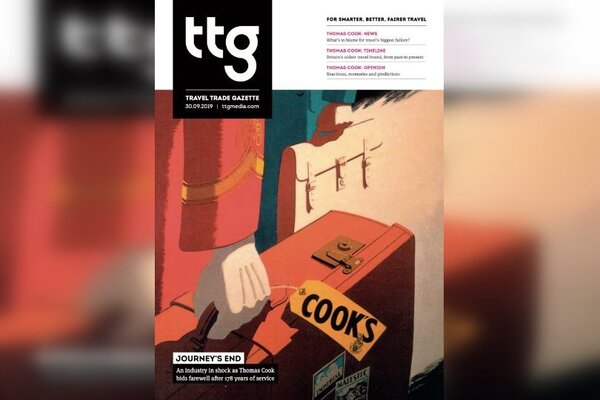TTG at 70: The ash cloud, the rise of cruise – and the death of an institution
 Gary Noakes
Gary NoakesThe 2010s started with travel’s worst winter for 30 years and the clean-up from the pre-Christmas collapse of Scotland’s Globespan Group, including its Flyglobespan budget airline.
There was also the aftermath from an attempted suicide bombing on a Delta flight from Heathrow to Detroit, which resulted in security being tightened further at UK airports.
The Arab Spring protests disrupted travel to North Africa, particularly Egypt. The region continued to be hit by turmoil, most tragically in 2015 when a gunman killed 38 people – including 30 Tui customers – at a beach resort in Tunisia. The same year, a bomb downed a Russian tourist flight leaving Sharm el Sheikh.
Terrorism was a feature of the decade, including the tragic death of Westoe Travel apprentice Chloe Rutherford, 17, and boyfriend Liam Curry, 19, in the 2017 Manchester Arena bombing. Sri Lanka was also hit; a series of Easter bombings in 2019 claiming 269 lives.
An avoidable tragedy saw two Thomas Cook reps face trial over the deaths of two children in Corfu from carbon monoxide poisoning. They were acquitted, but a hotel manager and electrician were jailed.
Meanwhile, north-west Europe became a no-fly zone following the eruption of Iceland’s Eyjafjallajokull volcano.
Sustainability climbed the agenda in the decade, with former chancellor Philip Hammond telling airlines Air Passenger Duty (APD) and emissions schemes would force the sector to “pay its way”. Campaigns raged to iron out anomalies penalising the Caribbean and for APD to be used for sustainability initiatives. The first fight was won, the latter continues.
Travel retail was rocked by the merger of Thomas Cook and Co-operative Travel, creating a network of more than 1,200 shops. However, Cook closed 195 stores two years later as online sales outpaced retail. Meanwhile, 60-branch chain Bath Travel saw its turnover slump by 30% in 2013 to less than £12 million. Hays Travel duly stepped in to acquire the business.
Sun sets on Cook
Cook issued three profit warnings in 2011, and it debts mounted. It later secured £1.4 billion in refinancing, buying breathing space until 2015. The operator slashed airline jobs, buying seats on easyJet instead, but went on an ill-advised £237 million acquisition spree.
Cook’s £163 million loss in 2018 and ballooning debt saw shares plummet. In 2019, an attempt to offload its airline failed and in September 2019, the world’s oldest travel brand collapsed after 178 years.
Another household name disappeared in 2017 with the failure of Monarch Airlines and Monarch Group, with 110,000 of its passengers repatriated regardless of their Atol status. The debacle bolstered support for bringing scheduled airlines under the Atol umbrella.
Paul Evans’ Lowcosttravel group also failed, short-changing 270,000 clients, as Evans had operated the company outside Atol. Super Break and All Leisure Group were among other collapses.
Perhaps the decade’s great success story was the rise of cruise. P&O Cruises launched Britannia; Royal Caribbean debuted Anthem of the Seas; and Virgin entered the market with its quirky Virgin Voyages brand.
Ships started to become resorts in themselves, with additions like rollercoasters. There were, however, the first signs of overcapacity affecting the sector, which was also rocked by the 2012 Costa Concordia disaster that left 32 dead.
Brexit fallout
In aviation, the Boeing 787 began flying, with Tui among first customers. The 787 marked a step change by using composite technology, which helped reduce jet lag. The 787 was later used by Qantas to fly UK-Australia non-stop.
Airbus’s answer, the A350, also entered service, while the A380 – launched just a few years earlier – ceased production in 2019. The same year, Boeing saw its 737 Max grounded after two fatal accidents claimed 346 lives amid allegations of corporate negligence.
Elsewhere, debate over Heathrow’s third runway began, with all political parties initially ruling it out. However, a lengthy inquiry ruled it in before the pandemic quashed ambitions.
Airline developments included British Airways’ acquisition of BMI and its Heathrow slots from Lufthansa, with the German carrier later upsetting agents by introducing a €16 fee for GDS bookings. Norwegian Air began offering £56 one-way flights to the US from Gatwick, while Alitalia entered administration. Flybe also went bust before being briefly resurrected.
The 2010s also saw easyJet reveal ambitions to become an operator; Tui phased out the Thomson and First Choice brands; while Virgin Holidays went direct sell. Among consolidations, Inghams owner Hotelplan bought Explore from Cox & Kings, while On the Beach surprised the industry with its purchase of Classic Collection. Cox & Kings went on to be acquired by Abercrombie & Kent.
Travel also successfully headed off the rise of bogus sickness claims, with several claimants jailed or fined.
One constant in the latter stages of the decade was the fallout from the Brexit vote. The value of sterling plummeted, while ski operators downsized their programmes now they were no longer able to post UK staff to work in chalets.
What did it all mean?
The decade saw seismic changes with the disappearance of Thomas Cook and Monarch, leaving huge gaps in the market others are still filling, and precipitated the rise of Hays Travel.
For operators, terrorism and political unrest meant some areas were off-sale for years, but cruise grew and grew. Issues like Heathrow expansion, Atol reform and those stemming from Brexit remained unresolved as we reached 2019.
But what was to follow in 2020 would make these problems look positively trivial....
TTG at 70: Opening up the archives
During our 70th anniversary year (2023), TTG charted the history of the travel industry through a series of special features delving into the magazine's 70-year back catalogue, all of which is archived on the TTG Media website. Here is the story so far:
- How travel took on the Covid crisis – and won
- The long journey to package holiday perfection
- How travel agents have stood the test of time
- The extraordinary rise of the cruise industry
- Aviation's highs and lows through the ages
- The ash cloud, the rise of cruise – and the death of an institution
- How – and why – terror changed travel forever
- The 90s – the decade that just about saw it all
- How travel's boom-bust nature came to be
- The 'big bang' that made travel affordable for all
- All hail the package in the Swinging Sixties
- The rise of mass travel, and where it all began
Sign up for weekday travel news and analysis straight to your inbox

Gary Noakes
Supplier Directory
Find contacts for 260+ travel suppliers. Type name, company or destination.










